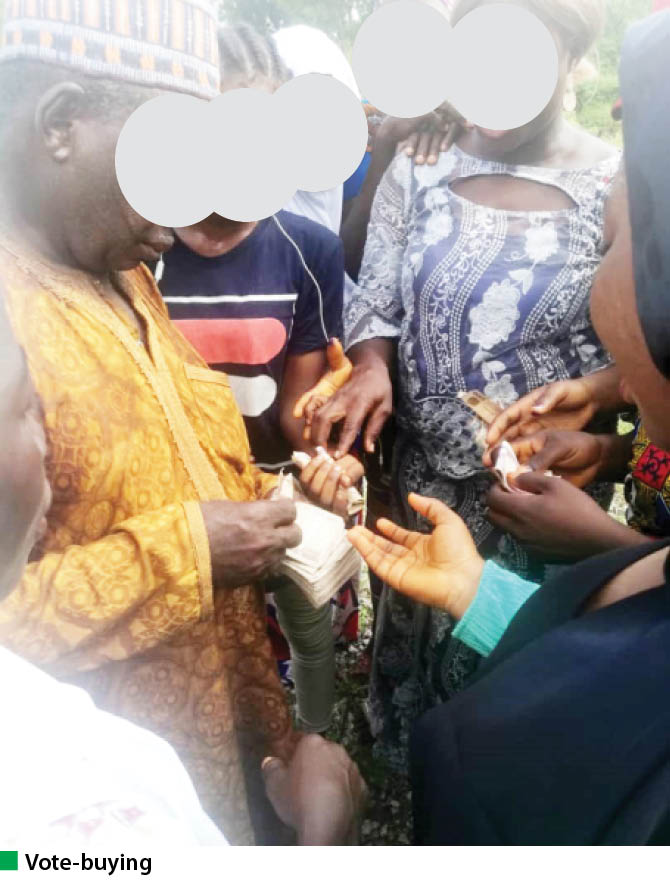The term ‘vote trading’ can refer to a situation whereby people agree to cast ballot in a certain way in which they would have done otherwise if they had not been influenced by immediate or future benefits. Without doubt, vote trading is judged unethical by any dispassionate political observer given that voting is purely transactional in nature.
While vote trading is an old concept that is seen in big businesses and other large organisations, it is most common in the political arena of many countries in the world. From a receiver’s side, the act of vote trading may have a variety of meanings – such as constituting a contract, securing amends, accepting an auction bid, receiving gifts, recognising power, acknowledging goodwill, compromising personal principles, etc. Yet, in accepting or rejecting the buyer’s offer (to influence or not influence their electoral actions) receivers may act from the position of fear, duty, indignity, righteousness, gratitude, or premeditated self-interest.
It is safe to say that vote trading has characterised all elections in Nigeria since 1999. In every election year, there is evidence of the voting public being offered money, food, clothing, jobs, inducement of cash, etc. Although efforts were made by previous governments to curb vote trading in the country, there are still challenges that have not been addressed. For example, the Obasanjo administration (1999-2007) tried to curb vote trading to restore public confidence in the electoral process through signing the Electoral Bill which became the Electoral Act of 2006. Nevertheless, vote trading is still prevalent in Nigeria today, resulting in continuous loss of confidence in electoral outcomes.
This time around, there has been a qualitative shift in vote trading as seen in the Ekiti and Osun elections due to the impact of the new Electoral Law 2022 which have made other forms of electoral malpractices difficult. So politicians have resorted to inducing voters with cash on a scale more intense than previously .
According to the Post-Election Statement on the July 16, 2022 Osun State governorship election from the Centre for Democracy and Development’s Election Analysis Centre (CDD-EAC), the general atmosphere of the Osun election was peaceful with impressive voter enthusiasm. But despite the non-violent atmosphere, the CDD-EAC observers reported discreet vote buying in the Osun State election, which was however, an improvement relative to the brazen vote buying that was observed in the recent Ekiti State elections. This improvement was perhaps due to the increased presence of watchful anti-graft security personnel in Osun State.
Yiaga Africa, another civil society group, reports that they uncovered vote buying in the form of money and gift items in Atakunmosa West Local Government Area of Osun State. It reports that its Long-Term Observers witnessed and heard of the distribution of money and food items by candidates or their supporters while campaigning in parts of the state.
It is important to note that President Muhammadu Buhari had committed, several times, to ensuring peaceful, credible elections in 2023. The president’s most recent reiteration of this commitment was made on June 29, 2022 in Lisbon, Portugal. He gave assurances of a free hand to the Independent National Electoral Commission (INEC), restating that his administration would deliver peaceful, transparent, free, fair , and credible elections in 2023. Alluding to the examples of the Anambra and Ekiti gubernatorial elections, Buhari noted that his administration has consistently demonstrated its zero tolerance for interference in elections and insistence that Nigerians be given their right to vote for the party and candidate of their choice.
Therefore, we at Daily Trust call on President Buhari to live up to his promise of ensuring the conduct of elections that Nigerians would be proud of. There are several ways in which government can end vote buying in Nigeria. As a first step, government can adopt an institutional advocacy learning process through which the voting public is continuously flooded with electoral education content to enhance their understanding of anticipated behaviours and roles in democratic systems. It is worth noting that vote buying could happen many days before the election day such that candidates and political parties could influence the public through local and community leaders. In such cases of buying off the community leaders as a way of influencing their subjects, the anti-graft agencies such as the Economic and Financial Crimes Commission (EFCC) and Independent Corrupt Practices Commission (ICPC) should be mandated to perform their duties effectively.
The government should also ensure that inflexible consequences such as disqualification of candidates are imposed on offenders. The security agencies should keenly monitor the financial performance of political parties in the country to help break the conduct of morally reprehensible activities.
But by and large, the Nigerian government must recognise that vote buying is a consequence of numerous factors which could include but not limited to pervasive poverty; and desperation amongst politicians and political parties to assume office at all costs. As Nigeria is home to some of the world’s largest concentration of poor people, the economic realities of voters are a weighty influence on their decisions as regards vote trading. Similarly, as elected positions are often accompanied by outrageous pecuniary advantage on the part of the politicians, bringing an end to vote trading could be exceedingly exasperating. Therefore, deliberate efforts must be put in to end the trend.

 Join Daily Trust WhatsApp Community For Quick Access To News and Happenings Around You.
Join Daily Trust WhatsApp Community For Quick Access To News and Happenings Around You.

